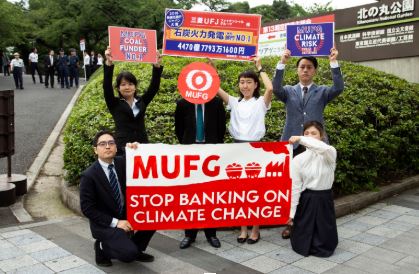Record rainfall across western Japan caused flooding of rivers and landslides. To date, 176 lives are known to have been lost in 13 prefectures. Dozens of people remain unaccounted for and hundreds of thousands of displaced residents are living in evacuation centers. One of the reasons raised for the exceedingly large amount of casualties is because residents were not prepared for this level of flooding.
At least 179 dead as Japan reels from its worst flood in decades https://t.co/6sobpxDzBq
— BBC News (World) (@BBCWorld) July 11, 2018
Warnings are being issued about the risk of heat stroke as temperatures have risen to the high 30s during the day and thousands of homes are still without clean water and electricity.
To understand the record rains that have fallen on western Japan, we cannot ignore the reality of climate change. The science community has warned us that climate change is worsening already, and that the intensity and frequency of severe weather events are increasing as a result. In an unprecedented move, the Japanese Meteorological Agency issued an “emergency warning against heavy rain” for up to 11 prefectures during this period. The rains that have fallen on western Japan “double the amount of rain that falls in a normal July.”
Unfortunately, so far, Japanese media have been silent on the connection between this disaster and climate change. This tragedy must not be written off as another unexpected consequence of “unusual weather patterns.” Japanese media outlets have a crucial role to play in informing the public about the scale of climate change and the ways it is already destroying our communities.
Japan struggles to get help to victims of worst floods in decades https://t.co/RMjnXRqcFS pic.twitter.com/CKhBKJpmvE
— Reuters (@Reuters) July 10, 2018
Our hearts go out to those affected, but as we rebuild the homes and business swept away by floods and landslides, we must stop to think about the reason weather patterns are becoming more extreme. Disaster prevention and mitigation measures are important for the communities most vulnerable to climate change, but they can only go so far, as scientific consensus suggests the situation is going to continue to worsen.
As the communities that fell victim to this latest tragedy turn to recovery, we must loudly declare “No more” to the governments and corporations that support and finance the fossil fuel industry, even in the face of the stark warnings of climate scientists and the suffering of vulnerable communities. We have known for too long that fossil fuel consumption drives climate change and that a fossil-free economy is the only viable solution to this problem.
 Action in front of Japanese Major Bank’s AGM (June 2018)
Action in front of Japanese Major Bank’s AGM (June 2018)
In September, we will call on residents and citizens of Japan to mobilize for the global Rise for Climate day of action and join us in calling for Japan’s banks to stop funding climate change and support a rapid and just transition to a 100% renewable energy future for all.